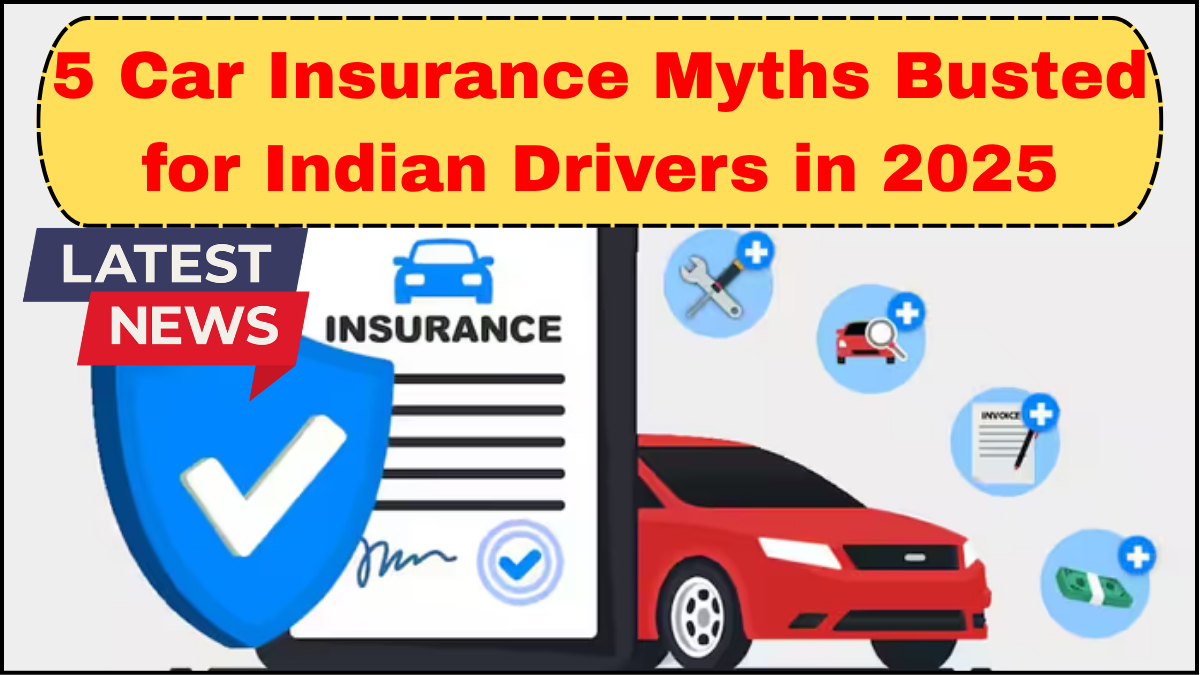Understanding how car insurance works in 2025 is more important than ever. With increasing digitization, evolving regulations, and broader policy coverage, many Indian drivers still fall for outdated or misleading beliefs about their coverage. These car insurance myths in 2025 could lead to wrong decisions, financial loss, or gaps in protection.

Let’s debunk the top five myths clouding the minds of Indian car owners today—and back it up with real facts from the current landscape of Indian vehicle policy.
Myth #1: “Third-Party Insurance Is Enough for Every Situation”
Reality:
Third-party insurance is legally mandatory in India, but it only covers liabilities toward others—not damages to your own vehicle. Many assume this minimum requirement equals complete protection, which is far from true.
Why it matters in 2025:
With rising road accidents and costly repairs, relying solely on third-party coverage can leave you exposed. A comprehensive policy includes own damage cover, natural disaster protection, theft, and more—making it the smarter choice for long-term vehicle safety.
Myth #2: “Claiming Insurance Will Always Increase My Premium”
Reality:
While making a claim might affect your No Claim Bonus (NCB), it doesn’t automatically increase your premium every time.
What Indian vehicle policy facts say:
Premium hikes depend on multiple factors: the severity of the claim, your driving history, location risk, and insurer-specific underwriting. If the claim was minor and your overall profile is strong, your next renewal may still be reasonably priced.
Pro Tip for 2025:
Use NCB protect add-ons where available. They allow you to make one or more claims without losing your NCB, thus keeping your premium steady.
Myth #3: “Online Car Insurance Is Risky or Less Trustworthy”
Reality:
Online insurance platforms are fully regulated by the Insurance Regulatory and Development Authority of India (IRDAI). In fact, they offer greater transparency, faster processing, and often better discounts.
Why it’s more relevant than ever:
In 2025, digital-first insurers and aggregators dominate the market. Features like instant policy issuance, paperless renewals, and AI-based claim approvals have revolutionized the buying experience.
Bottom line:
Buying car insurance online is not only safe but often smarter—especially if you want to compare quotes, customize add-ons, or renew at the last minute.
Myth #4: “Older Vehicles Don’t Need Comprehensive Coverage”
Reality:
This assumption ignores both the real value of your asset and the rising cost of spare parts. Even if your vehicle is a few years old, repairs can still drain your wallet.
Indian vehicle policy facts to consider:
In 2025, many insurers offer tailored policies for older vehicles that include essential protection without the full premium burden. You can also opt for standalone own-damage covers for added flexibility.
Don’t assume based on age—assess based on risk.
Myth #5: “Insurance Doesn’t Cover Natural Disasters”
Reality:
This is one of the most damaging car insurance myths in 2025. Comprehensive policies do cover damages caused by natural calamities like floods, earthquakes, and landslides.
Especially relevant for Indian drivers:
With climate-related incidents increasing across India—from urban flooding in Bengaluru to landslides in the Northeast—natural disaster coverage has become essential, not optional.
Quick Tip:
Check the policy exclusions carefully. While most disasters are covered, events like nuclear war or deliberate negligence won’t be.
Final Thoughts
Falling for common car insurance myths in 2025 can cost Indian drivers more than just money—it can risk your vehicle, peace of mind, and legal standing. Knowing the real Indian vehicle policy facts gives you the power to choose the right coverage, file smarter claims, and ultimately get the best value from your insurer.
Frequently Asked Questions (FAQs)
Q1. Is third-party insurance enough to drive legally in India?
Yes, third-party insurance is mandatory under Indian law, but it only covers damages to third parties, not your own vehicle.
Q2. Will claiming insurance always lead to a higher premium?
Not necessarily. Minor or single claims don’t always result in higher premiums, especially if you have an NCB protection add-on.
Q3. Can I trust online car insurance providers?
Absolutely. As long as the provider is registered with IRDAI, online platforms are safe and often offer more competitive options.
Q4. Should I renew comprehensive insurance for an old car?
If the car is still in use and repair costs are high, comprehensive or own-damage cover is recommended—regardless of the car’s age.
Q5. Do car insurance policies cover natural disasters in India?
Yes, comprehensive policies cover most natural disasters like floods, earthquakes, and storms, but always review the exclusions.
click here to learn more
